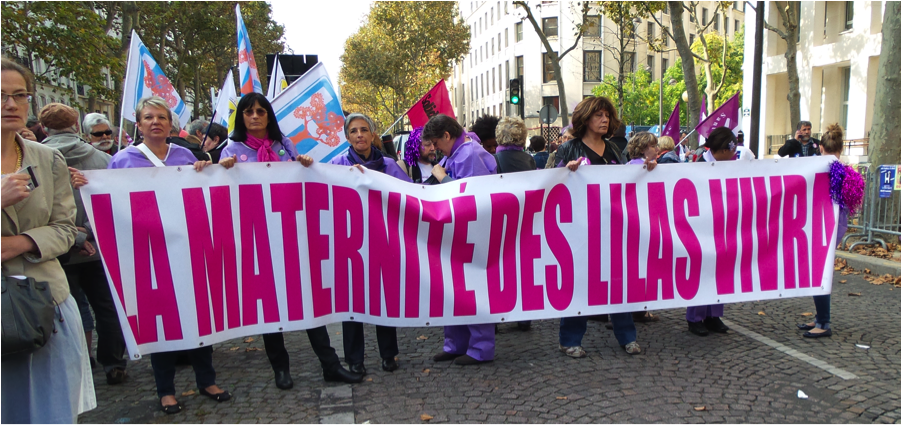On September 23d, an important demonstration was organized in front of the Minister of Health in Paris. The demonstration was organized by the movement Convergences of the hospitals fighting against Hosterity (Convergences des hopitaux en lutte contre l’Hosterity), which gathers together personnel from public hospitals associated with numerous associations defending women’s reproductive rights. They coined the term hosterity to indicate the strong correlation between the disassembling of the public hospital and the austerity measures that have shattered public services throughout Europe.
The neoliberal grip on the European population through the implementation of austerity measures has opened the way to uncontrollable privatization of hospitals and health care services. In Germany, Greece, the Netherlands, Spain, France and beyond, public hospitals are sold to private firms or health care systems. In particular, the French health care service, once praised for its efficiency and quality, has been the target of a series of neoliberal restructurations.
In 2012, the Chairman of the European Bank, Mario Draghi stated that the European Social Model was gone. What he meant was that under the aegis of neoliberal ideologues the rhetoric of needed reforms was going to force a drastic change for the public and its services. The immediate target has been the reproductive health sector, followed by other health care services.
The story of the maternity hospital of les Lilas epitomizes the gendered techniques employed to disassemble a solidarity system and the need for an active and political convergence of resisting forces. And so the Convergence movement was created.
On September 23d the women of the maternity hospital arrived with their now famous banderole that says, “La maternité des Lilas vivra”. The Maternity hospital of Les Lilas will live. The determination of its personnel is remarkable. They know first hand the accounting manipulations that have strangled their department and have denounced this attack on public health care. Giving birth is free of charge by national law, and so the way to attack this principle was to create administrative constraints and force many local maternity departments to close down and send women to maternity “factories” with fewer and fewer midwives and ob-gyn.
I talked with head of the department Marie Laure Brival and the midwives and the nurses, and the members of the supporting collective. In 2009, said Marie Laure Brisal, the budget for the necessary renovations was agreed on by the experts and signed by the Minister of Health. Then, under the same government, the restructuration of the health administration created the conditions through this new health plan for a retroactive review of this budget. The goal was to create big health structures in which ob-gyn departments had to be rearranged in factory-like structures with fewer personnel, and more deliveries and other reproductive services. In France, maternity hospitals take care of delivering babies as well as contraception and abortion services since both are what women need.
The maternity hospital les Lilas is located in a populous suburb of Paris and provides personal non-threatening service to women. The dedication of the staff to the comfort of women has been a model for many.
“Our fight has been going on for the past four years and has taken a national dimension, we receive support from everywhere. They even come from beyond the French borders from all over Europe” said Marie Laure, adding, “They fought with obstinacy and elegance.” When candidate to the presidency of France, Francois Hollande gave his support to the fight and promised that Les Lilas would remain open. “Unfortunately,” said Maris Laure Brival, “Political statements do not last long.”
The midwives told me that they were exhausted. Besides providing an excellent and peaceful environment, they have to organize and continue the actions in every way possible. I talked with women who have been patients there and all explained that it was a memorable experience.
Having just won a battle with the guarantee that they will not be absorbed by a bigger structure, they still have to obtain the complete funds to continue to put women first in a maternity hospital.
The bureaucratic structure Regional Health Authority have been operating since April 1 2010, Although they were presented as a necessary tool to enhance the health care system efficiency, their real function was to rationalize in a financial/accounting manner the delivery of care, in other words reduce social expenditures.
The American for-profit health care system is becoming the norm. The most universal systems are being transformed with the usual neoliberal tools that have the capacity of turning social responsibility into a violent arithmetic of profitability and deficits reduction. With this logic, the rhetoric of competitive enterprise and dehumanized factory production is applied to places of care.
In this context the struggle of the maternity hospital des Lilas is emblematic of the fight of women against the impoverishment of their lives with an overall continuously contested reproductive rights and health. Women are enormously affected by austerity measures or hosterity. First, they fill the ranks of poor workers, an expanding category. Women are overwhelmingly employed in care facilities, 49.8% of the public sector employment in France. In addition, when public care services are curtailed, women become unpaid care providers with all the consequences that implies. Finally, the restructuration of the reproductive health structures that are being pushed with this Hosterity represents an enormous set back for the entire health care system.
Last week, the demonstrators reaffirmed that health and social protection are not for sale. The convergence is broad. Other movements were represented from the struggle against austerity measures in Greece to the Spanish struggle for reproductive and health rights. Solidarities are being formed against the fragmentation of the civil society that characterizes the neoliberal order with its rhetoric of competition. Marie Laure Brival took the microphone and ended her speech with Tous ensemble resistons (all together we can resist) and the crowd repeated it several times. We are not competing we are cooperating against the neoliberal order!

